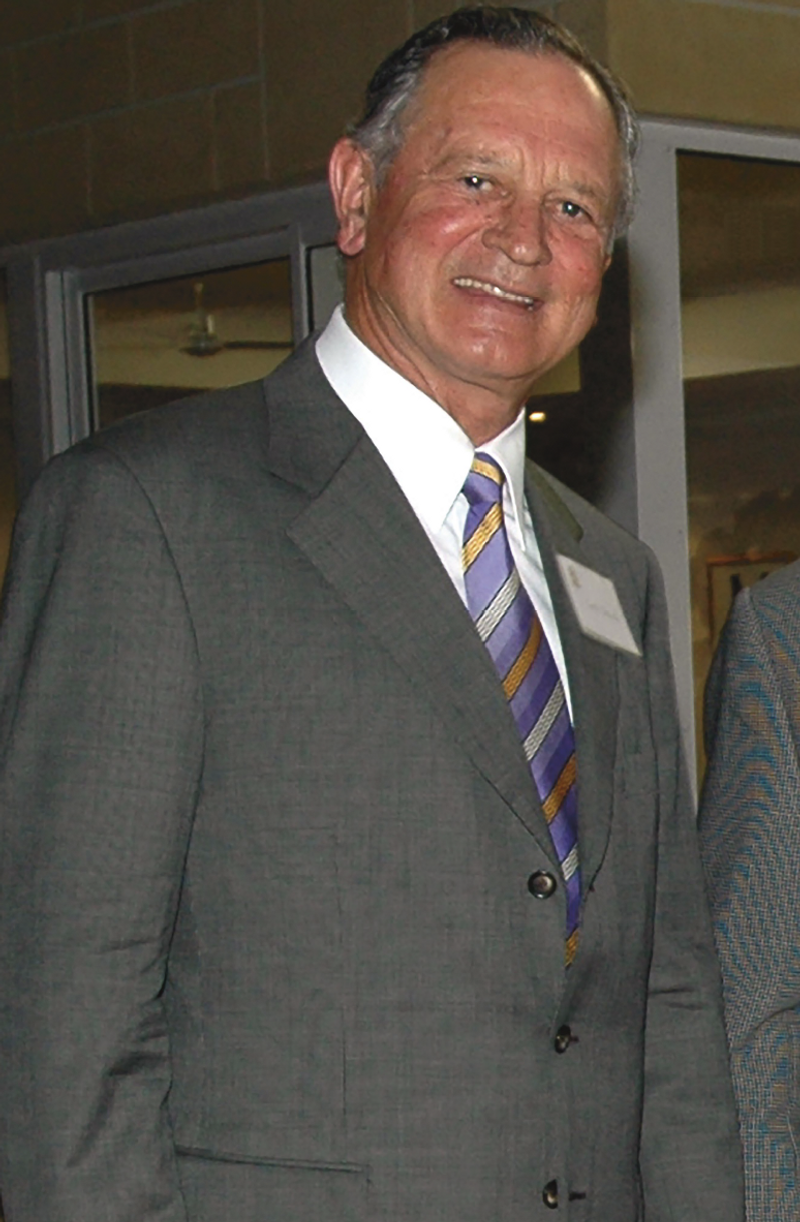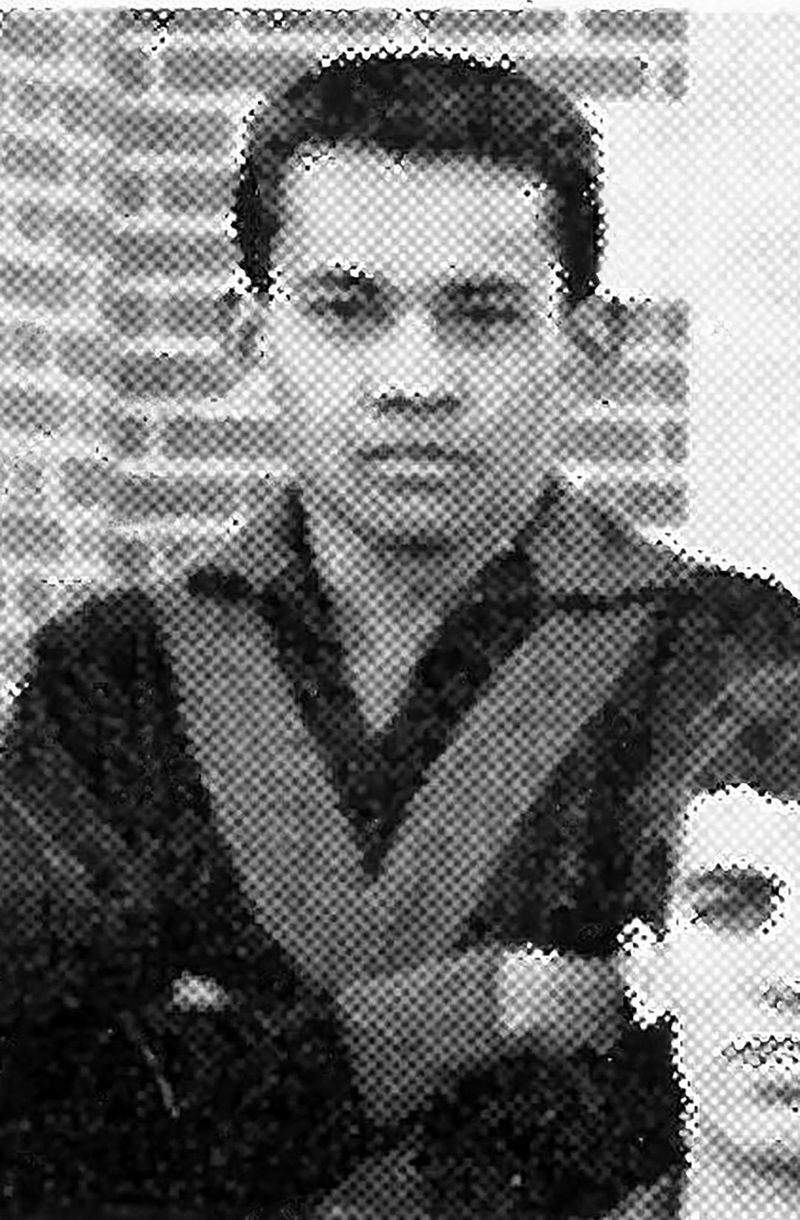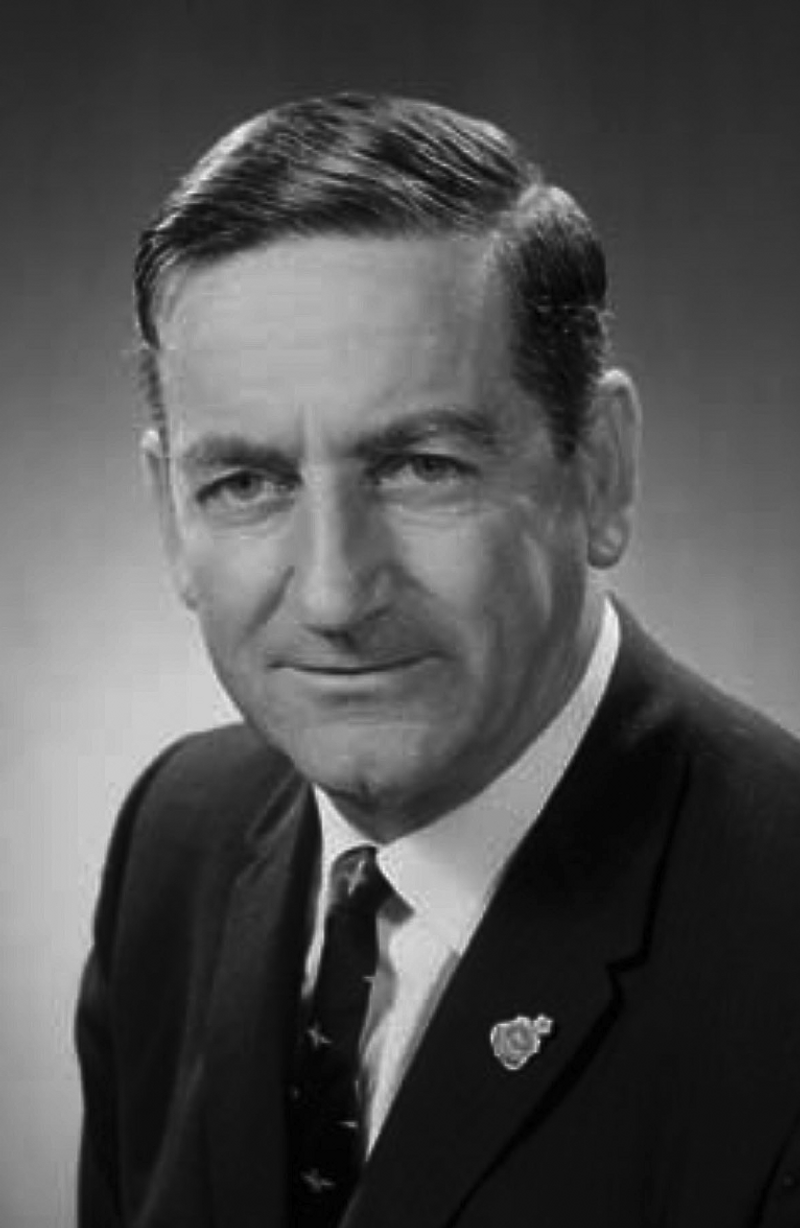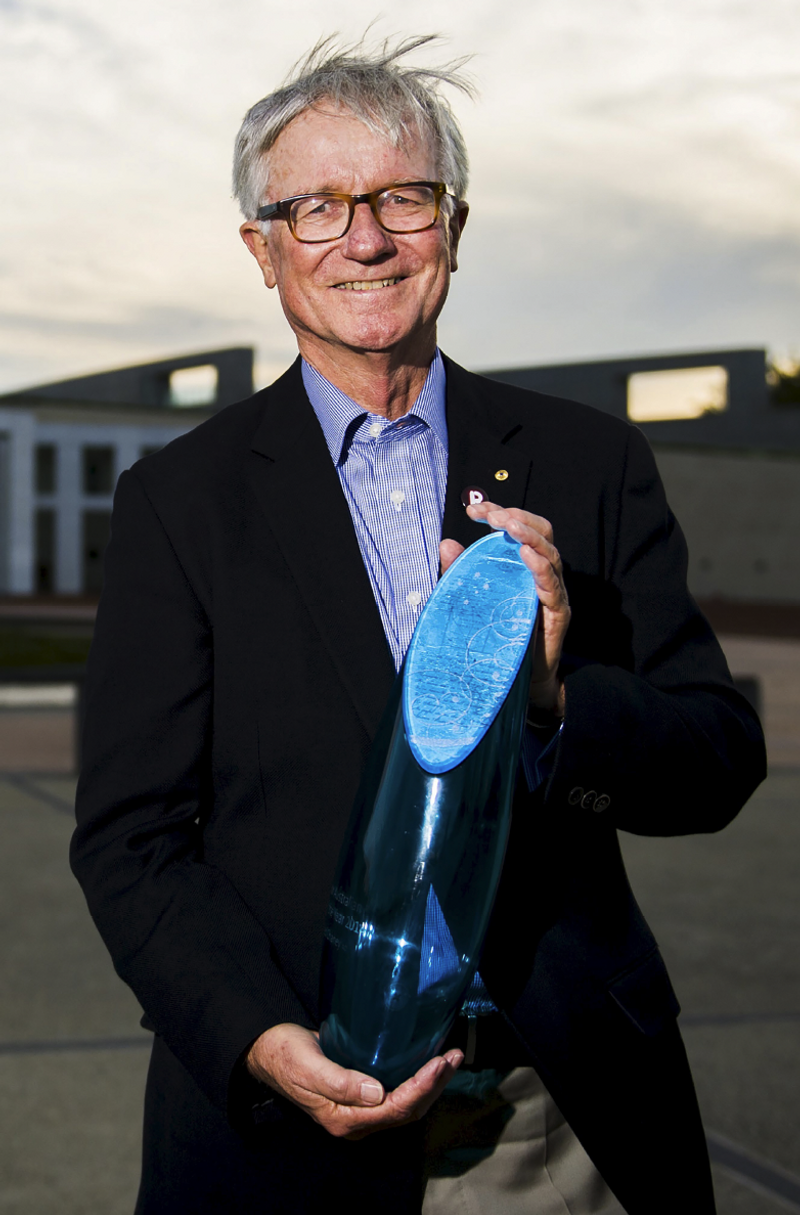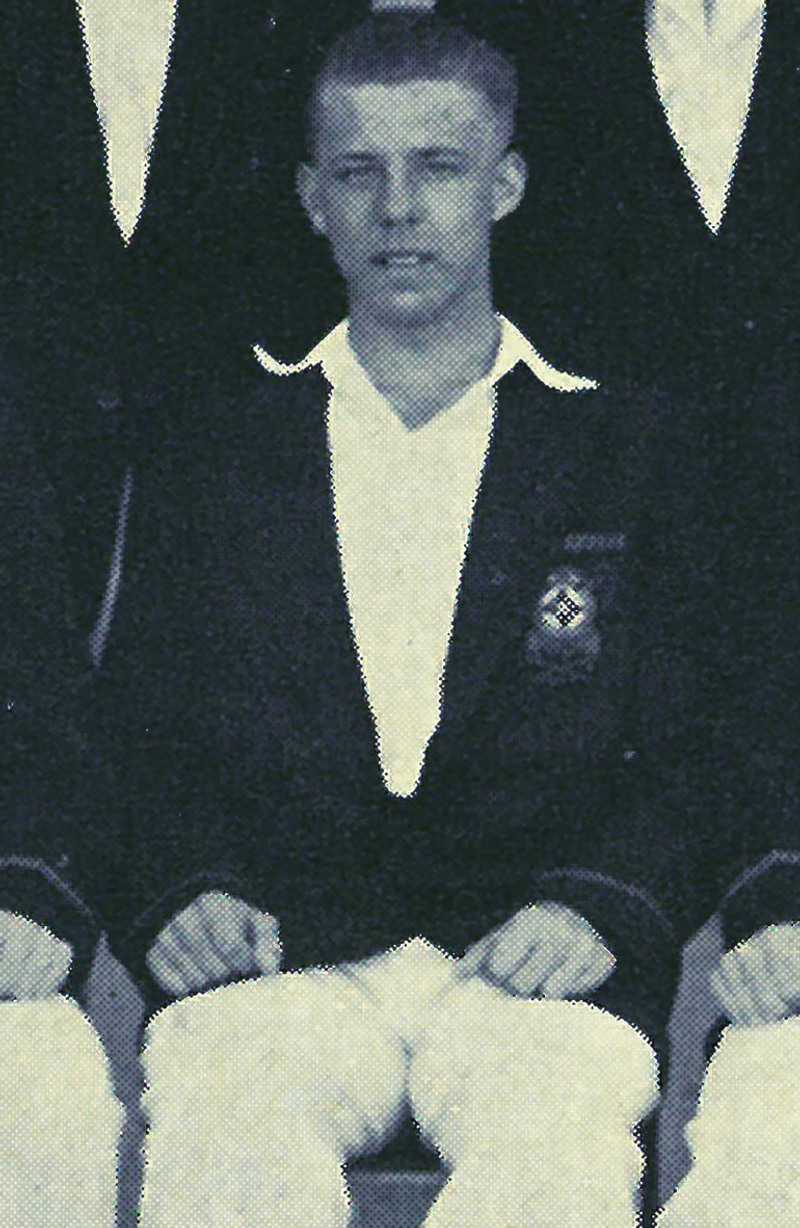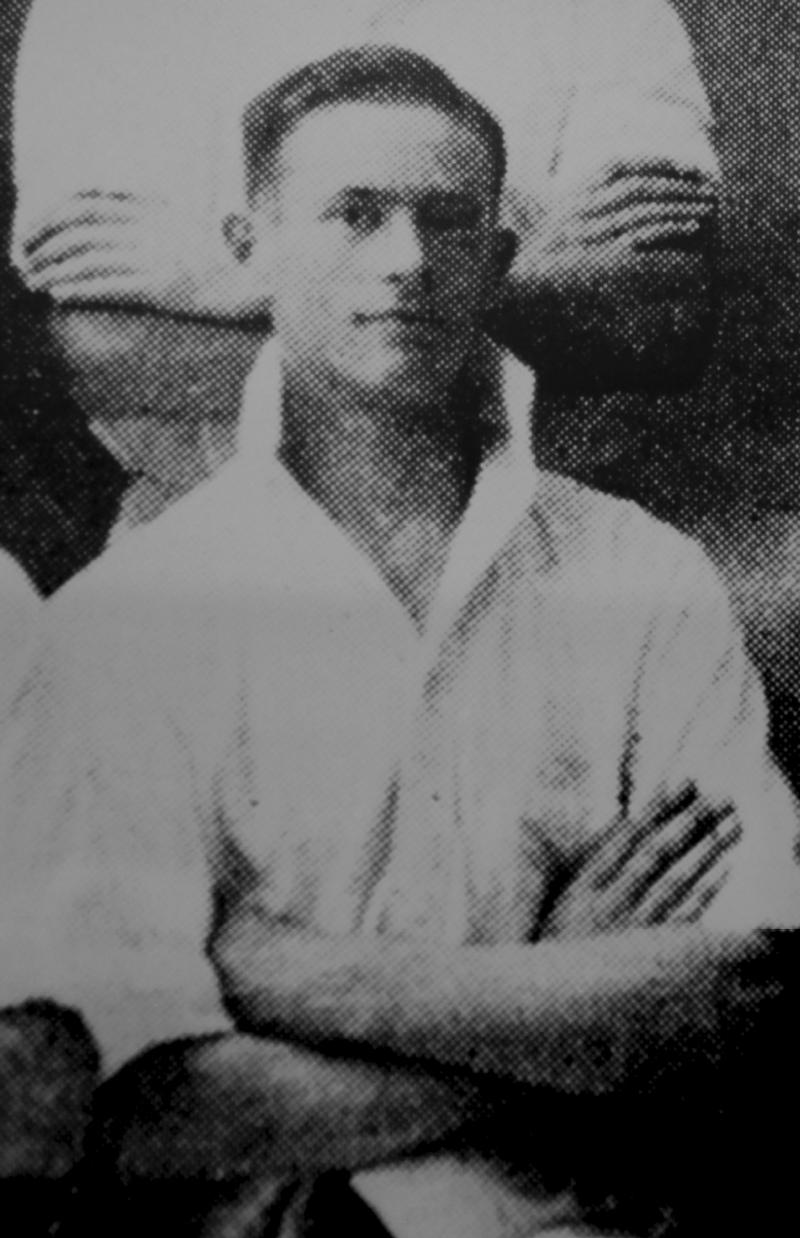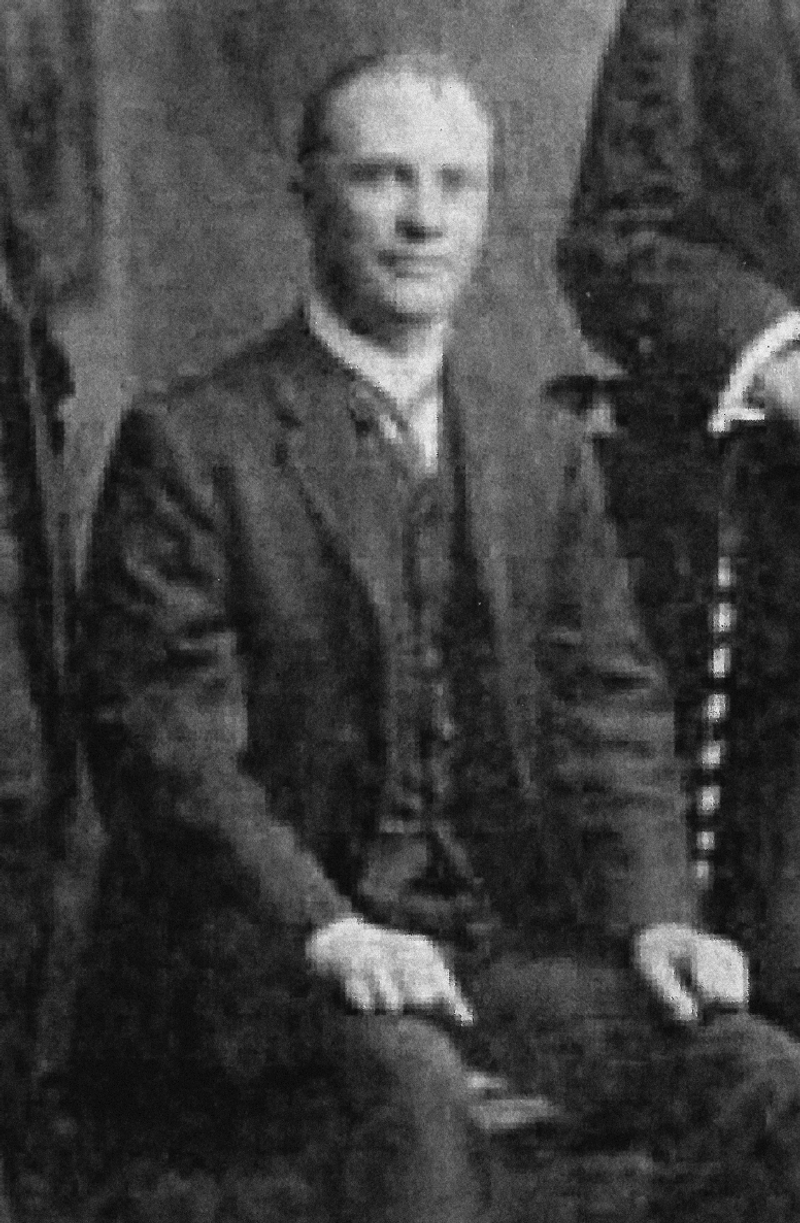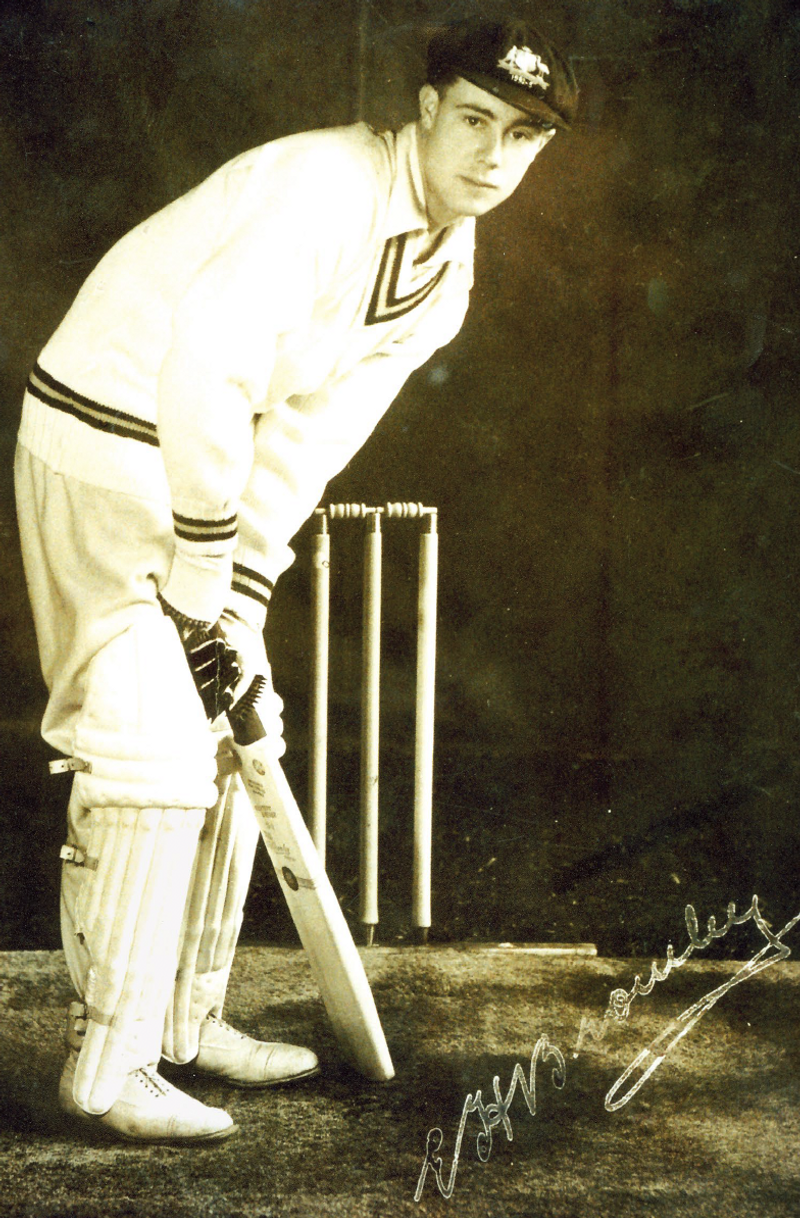Contact
Geoff Churack AM
Class of 1955
The Churack Pavilion, on the boundary of Memorial Oval, is not only an outstanding sports and viewing facility, but also caters for the many needs of students, Old Boys’ communities and guests of the College. The principal donor and fundraiser for its construction was Geoff Churack (one of three Churack boys 1946-55) who says the much-needed building was a great opportunity to express his thanks and appreciation to the Christian Brothers, the College and his parents for their contribution to his education and values.
Geoff came to Aquinas from the North Dandalup Primary School (where his Dad was the headmaster). Geoff made a major contribution to the College over the next four years. He captained 1st XI Cricket, was vice-captain of 1st XVIII Football, and a member of the Athletics, Swimming and Shooting teams. He was Under Officer in Cadets and a College Prefect.
On leaving school Geoff worked for GM Holden in Mosman Park and studied accountancy, business and sales management, and people skills. He also learnt how to manage and own car dealerships in a growing West Australian population. Since 1965, he has had active interests in Holden, BMW and Toyota dealerships. He still gets his greatest pleasure from seeing good young people grow and succeed. The Australia Day Awards recognise the achievements of a diverse group of West Australians who have excelled in their fields to enrich the communities in which they live. In 2018, Geoff was made a Member (AM) for his philanthropic support of medical research and education at both Notre Dame and Murdoch universities as well as his service to the retail automotive industry and many sporting groups.
Geoff’s commitment to cricket and cricket people is also evident through the many WACA committees and his Life Membership of the Incogniti Cricket Club (England and WA). He remains an ongoing benefactor of Aquinas College and the University ofNotre Dame.
Jimmy Chi
Class of 1965
Jimmy Chi was born to a Japanese/Chinese father and a Scottish/Aboriginal mother from the Bardi tribe. Although brought up in Broome, he was sent by a group of Irish nuns and German priests to a Catholic college in Perth in Rossmoyne. Then he was selected to attend Aquinas College.
He was a bright student and did well academically and on the field. Jimmy left with the second position prize for Religious Education and played in the 1st XVIII in his final year. He went to university the following year but did not finish his degree.
Tragically Jimmy was badly injured in a car accident in his early 20s and spent three weeks in hospital. Although he recovered physically, all who knew him to say he was never the same again and Jimmy was diagnosed with schizophrenia in 1970 at the age of 22. He felt that he had let people down by not finishing his degree and he struggled to find the resilience needed to get back up and fight the good fight. It was a struggle that would stay with him his whole life. Music provided him with a path back to normal life and Jimmy wrote songs with several friends.
He formed the group "Kuckles" in Adelaide while studying at the Centre for Aboriginal Studies in Music (CASM). An audition tape titled "Millya Rumarra" won him the opportunity to perform in Germany. This became the basis for his most famous contribution to Aboriginal culture: Bran Nue Day. In 1991, it earned Jimmy the Human Rights and Equal Opportunity Commission Drama Award. The stage production toured Australia winning awards and the movie was released in 2009. It was greeted with mixed reviews but helped cement the careers of a number of now well-known indigenous actors. But the significance of this work and others of Jimmy Chigoes far beyond the critic’s pen. He forced the issue of indigenous identity into the limelight.
Jimmy faced his own demons bravely and his contribution to Australian artistic endeavour is the greater because of them. In 1997, Jimmy received the Red Ochre Award for his contribution to the indigenous arts and was also made the patron of SANE Australia. In 2004, Jimmy Chi was honoured by the Western Australia as a Living Treasure.
Hon. Justice John Chaney
Class of 1970
John is the youngest of the Chaney dynasty, and one of the most hard-working which is impressive in the context of the family’s formidable work ethic. John, in spite of having climbed to the top of his profession, has that lack of ego typical of a great Aquinian. Like his brothers, he did well in the classroom and on the sports field. He captained the First Eighteen, the Athletics Team and the Second Eleven in cricket. A “heady point winner” of the debating team, hewas also a CUO in the cadets. He left in 1970 as Captain of the School and made the farewell speech at the end of the year Speech Night. He says being a boarder in his last year helped him when his father Sir Frederick Charles Chaney moved to Darwin as Minister for the Northern Territory.
After graduating in Law from UWA in 1976, John became a partner at Northmore Hale Davy and Leake, later Minter Ellison and Co in 1980 and stayed fourteen years before joining the Independent Bar in 1994. He specialised in commercial litigation, planning and administrative law, and medical negligence. In 2004, John was appointed as judge in the District Court, and shortly afterwards became one of two inaugural deputy presidents of the State Administrative Tribunal (SAT) in 2005, a new jurisdiction which saw the streamlining of 80 different decision-makers into one overarching Tribunal. This new jurisdiction covered a wide range of issues: planning cases, from single houses to massive commercial developments; professional and vocational regulation and disciplinary proceedings; building and strata titles disputes; and guardianship cases where the tribunal took the responsibility of protecting vulnerable people. This period of his career cemented John’s reputation as one of the leading lights of the legal profession in West Australia.
Continuing to climb he became President, SAT and a justice of the Supreme Court in 2009. Throughout his career, his love of cricket stayed with him and he toured internationally with a team of legal eagles known as “The Stragglers” playing with fellow devotees across the world.
He has, over the years, sat on boards of not for profits such as the College of Optometrists, based in Melbourne and currently serves as Chair of the Piddingdon Society which fosters collegiality and mentoring amongst young lawyers. He was also President of the Law Society in 1991 and sat on its Council for ten years. After fourteen years as a judge, he retired and now practices as a mediator and arbitrator at Francis Burt Chambers.
Few in the legal profession of West Australia have John’s keen eye for detail or his ability to unpick complex cases. John remembers back to his farewell speech at Aquinas College where after encouraging the next generation of students to make the most of their time he finished by saying: “So do your best and I hope for your sakes that when your time comes, it’ll be as difficult for you as it is for me to say “Goodbye Aquinas”.
Sir Fred Chaney Sr KBE, AFC
Class of 1932
Social justice is a theme that runs strongly through the Chaney family, its roots with Fred Chaney Sr, the first of seven Chaneys to attend the school. His mother was widowed during his school years and he saw out the Depression as the son of a single mother. It left a mark and no doubt motivated him to secure a scholarship at Aquinas. He was an active member of the Debating team and continually shone on the athletics field: regularly winning the 100 yds and 220 yds, gaining a place in the “quarter-mile” and the hurdles. He was Champion Athlete in 1931 and won the 100 yds and 220yds at Interschool Athletics. He was in the winning Alcock Shield team in his leaving year, 1932.
Economic necessity dictated that he train as a teacher rather than pursue his chosen path of engineering. Fred appointed initially as monitor, and with no official training nevertheless, taught in state schools for nearly a decade. He met and married Mavis in 1938 and together they raised six children: Fred (Jr), Robin, Karen, Richard, Michael and John.
Fred enlisted in the RAAF, trained as a pilot and qualified as a flying instructor before serving in Papua New Guinea and Borneo. The courage and skill he displayed in hazardous operations in Borneo won him the Air Force Cross.
He returned to teaching for five years before resigning, as acting headmaster, to pursue politics. Fred held the federal seat of Perth for the Liberal Government from 1955 to 1969 and served in the cabinet for many years. Robert Menzies appointed him as Minister for the Navy in 1963. In 1970 he was appointed the Administrator of the Northern Territory and he established himself as a strong advocate of Aboriginal land rights. Both he and Lady Chaney were made blood brothers of Groote Eylandt Aboriginal artist Yirawala in recognition of his achievements. He was Lord Mayor of Perth from 1978 to 1982 and twice decorated by the Queen: once in 1970 with a CBE and again in 1981 with a KBE. Additionally, Sir Fred Chaney was state president of the Returned Services League.
Fred’s long history of public service is rooted in his fierce commitment to social justice and a belief in the inherent equality of people. The drive that sustained his impressive list of achievements came from values instilled during Catholic schooling in Perth. This and the strength of his marriage to Mavis were the two aspects of his life he has successfully imparted to his children.
Fred Chaney Jnr AO
Class of 1957
The second Fred Chaney to grace the playing fields of Aquinas was truly a chip off the old block. He left Aquinas College as prefect, third in his year overall, captain of the Debating team and winner of the Oratory Prize. He graduated from university in Law and was admitted as a barrister and solicitor in WA in 1963. He practised in Papua New Guinea but knew ultimately he would follow in his father’s footsteps and join the cutthroat world of politics. So it was, he was elected in the 1971 by-election of Ascot running for a seat in the State Legislative Assembly. He was elected to federal parliament as a Liberal Senator in 1974 and became leader of the Opposition in the Senate from 1983 to 1990 when he became the first member for the division of Pearce in the House of Representatives. He was named deputy leader of the Liberal Party in May 1989 and retained this post until April 1990, two months after transferring to the Lower House.
Like his father, he was a man of integrity who could see that the needs of the country should take precedence over the needs of the party and, therefore, left it in 1995 believing that he needed to work cross-party to get things done. His hard work in support of marginalised people has never faltered and indeed runs like a rich seam through the Chaney family.
He was a founding co-chair of Reconciliation Australia and an early advocate of aboriginal voting rights. Fred established the Aboriginal Legal Service of Western Australia and he sat as Federal Minister for Aboriginal Affairs (1978-80). He was Deputy President of the National Native Title Tribunal and more recently Chair of Desert Knowledge Australia. Fred also played a key role in setting up the Graham Farmer Foundation which supports indigenous young people to reach their potential.
Fred, not surprisingly, received an Officer of the Order of Australia in 1997 for service to the Parliament of Australia and to the aboriginal community. Prime Minister Tony Abbott also declared him Senior Australian of the Year in 2014 and he was awarded the Centenary Medal for service to parliament and education in 2001.
Brian Aubrey Burt
Class of 1955
Born the son of Aubrey, a journalist and former WA middleweight boxing champion and Irene, nee Dobson, Brian came to Aquinas when his family moved to Perth in 1946. He won a state bursary to study dentistry at the University of WA. During his university days, Brian’s pride in Aquinas was very evident to all who saw him driving around in his ute which was painted in the trademark red
and black stripes. On graduating, Brian practised in Mt Magnet 600kms north-east of Perth. He met Lizzie Meehan from Geraldton who remembers the occasion very clearly: “a hot dusty drive in the mobile dental van, it was an offer to make him a cup of tea that won his heart”. After marrying in 1965, they set off on the Oriana from Fremantle bound for the US, which was the beginning of a huge adventure. Brian completed a master’s program in dental public health at the University of Michigan in Ann Arbor and went on to study at the National Institute of Health in Washington DC. He and Lizzie moved to London for seven years where he worked at the London Hospital in Whitechapel, completed his doctorate and their two sons Ashley and Matthew were born.
As is frequently the case when you do a great job the first time around the University of Michigan pursued him and brought the family back as assistant professor of the School of Dental Public Health, and shortly after he became a professor. He held many senior positions in the public health arena before retiring in 2005 as Professor Emeritus.
Brian is world-famous for three editions of “Burt’s Book” which is obligatory reading for anyone pursuing dental public health. He was an expert in his field but was also known for his wholehearted mentoring of current and former students.
But this is only half his story: when diagnosed with high cholesterol and risk of heart disease he and his wife changed their diets and designed a rigorous exercise regime. Short runs around the block morphed into short road races and eventually marathons. In fact he competed in seven Boston marathons. (Best time: three hours and one minute!) They also competed in triathlons and Ironman contests in Hawaii and Perth.
Sadly, Brian lived with Parkinson’s disease since 2009. His passing on September 9, 2019, prompted a stream of testimonials from American and international friends, colleagues, and former students, many of whom he mentored through their invariably prestigious careers.
He inspired his students to achieve beyond their wildest expectations both in the classroom and on the running track. The Dean of the College of Dentistry at the University of Florida, Isabel Garcia said: “Brian leaves a tremendous legacy as an outstanding researcher, teacher, mentor and much more”.
Frank Joseph Bryant OAM
Class of 1927
Frances Joseph Bryant, or Frank as he was known, was a first-class, headline-grabbing cricketer who shaped the landscape of cricket in Western Australia. He was the youngest son of a cricket-loving family, with his two brothers Dick who captained the state, and Bill a prolific run-getter at his peak. He gained a place in the College XI at the age of 13 and claimed a record winning 546 runs for Aquinas in one season. Frank was a good all-rounder on and off the field. He played golf, bowls and football and was handball champion. But cricket was his first love: he captained the record-breaking team of 1927 and made over 1000 runs in Darlot Cup matches, as did his friend and peer Ernie Bromley.
Frank made a first-class debut for WA at the age of 17, in March 1927, playing alongside his brothers against South Australia at the WACA. Perth’s Daily News announced his place in the India tour squad in 1935 under the headline “Frank Bryant for India – Brilliant Career”. It reported the “unassuming and popular” cricketer “… is the possessor of a wide repertoire of strokes and he is seen at his best when in an aggressive mood. His sparkling batting has made him the centre of attraction on many an occasion”
In a series of firsts, it was the first time a WA player had toured for Australia abroad, and in another Frank and his brother Dick scored a century in WA’s first innings against Victoria, the first time brothers had done this in the same game.
After serving in the army during WWII Frank moved to Albany to run the White Star Hotel but returned to cricket to be a manager and administrator. At the time WA was not in the Sheffield Shield and Franksuccessfully argued that the state should be included. He managed the Australian teams that toured New Zealand in 1966-7, 1969-70 and 1973-74. Throughout his life, Frank campaigned for the sport successfully and played a crucial role in the granting of the WACA’s Test status in 1970.
He was awarded the Medal of the Order of Australia in 1981 and the Australian Sports medal posthumously in 2000 for his services to cricket. Frank would have approved of the manner of his passing had he but known. He died in 1984 while watching the Sheffield Shield final which WA eventually won, by two runs.
Capt. William Bryan
Class of 1898
William Thomas Bryan was the first boy to be enrolled at CBC Perth. He was one of two brothers who joined the same day in February 1894 and lived in Howick Street (now Hay Street). William’s and his brother Cyril’s were the first names to be put on the register. His father John Joseph (JJ) Thomas owned a commercial printing business, Bryan’s Print. JJ and his wife Annie Louise were some of the many small business owners who sent their children to the school in its first intake.
William was Dux in his leaving year, 1898. He took a job at the Perth Mint and soon afterwards formed an old boys group called the Old Collegians Association. William enlisted and was made a Captain in the First Australian Imperial Force. He died when a shell exploded in his trench at Messines, in Belgium on 8th June 1917 at the age of 35. William was clearly loved by all who knew him. The eulogy his brother wrote in the Western Mail and the WA Record was filled with emotion for the passing of his brother. He wrote: “I have beared my heart…so that in the time to come his children may read of the anguish that wrung the hearts of those whose greatest pride was that we owned their father as our brother”.
A letter to Archbishop Clune published in the 1917 Annual said of William: “…he was beloved by all of the other officers in the battalion… the Colonel to the youngest private in the battalion lost a very dear and true friend when Captain Bryan was killed.”
Ernie Bromley
Class of 1928
Ernie “Brom” Bromley will be forever remembered at the College as the first Aquinian to play Test Cricket and the first WA-born cricketer to play for Australia. He was, according to The Sunday Times of 1933, a “…forceful and punching left-hand batsman, a good bowler and a splendid fieldsman.”
Ernie was born in Fremantle and went to the Fremantle Boys’ School, he was subsequently recommended to CBC Perth by one of the Brothers. He was a significant force in the Aquinas Cricket XI and played 1st-grade cricket for Fremantle. During his time at Aquinas he scored 834 runs at an average of 37.9, including a memorable 146 against Scotch College.
When he left school, Ernie headed for Victoria and played for the state and St Kilda. In 1934, the year after the famous “Bodyline” series, Ernie was selected in the Australian squad to tour England. On returning to the College to a hero’s welcome that year, Ernie promised “to do his very best” to uphold the traditions of his “Alma Mater”.
Bill Brown, one of the “1948 Invincibles”, told Br Clery in 2006 “Ernie could catch anything. Whenever he returned the ball from the outfield, three to four men had to back up, so strong was his arm”. When playing against “Gentleman of England” in a 1934 tour the English captain asked him to move away from his fielding position a metre or two from the batsman. “She’ll be right”, replied Ernie, before taking a catch a couple of balls later.
Ernie married Elizabeth Winchelsea from Geelong in 1946. He died too young at the age of 54 in 1967, but he will always hold a unique and proud place in the history of Aquinas College and West Australian cricket. In 2004, Ernie was inducted into the Fremantle Sporting Wall of Fame.
